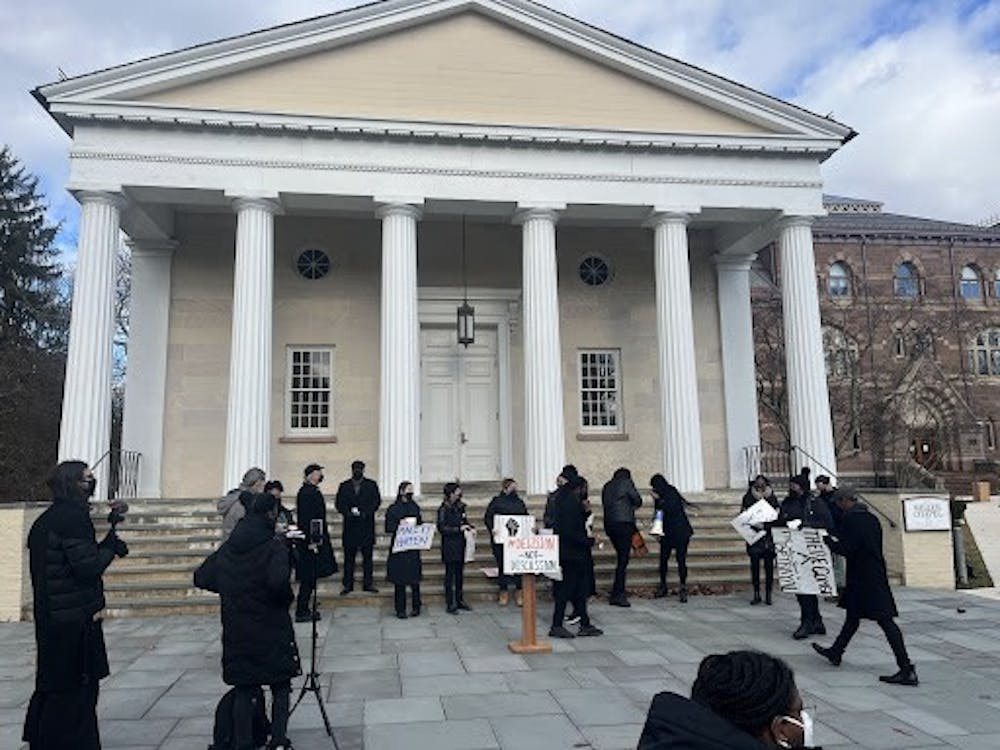The Association of Black Seminarians (ABS) at the Princeton Theological Seminary (PTS) held a demonstration on Tuesday, Jan. 18 outside the Miller Chapel, calling on administrators to rename the chapel. The chapel’s namesake — Samuel Miller, PTS’s second professor who taught at the school in the early 19th century — employed slave labor throughout his life.
Three days before the protest, which drew several dozen community members, the ABS released a petition demanding that the seminary’s Board of Trustees vote to remove Miller’s name from the sanctuary during its upcoming meeting on Jan. 25.
“Miller’s efforts against abolition and enforcing colonization of freed black slaves,” the group said in a statement to Planet Princeton, “does not reflect the theological imagination and pioneering spirit of this institution.” The group referenced The Princeton Seminary Slavery Audit Report, which found that Miller was a slaveholder during his early life and employed slaves while at Princeton.
Though commending the recent efforts by the Seminary to confront its history with slavery and the current condition of Black students — including “the renaming of the library to the Theodore Sedgwick Wright Library, the naming of the Betsy Stockton Center for Black Church Studies, and the appointment of a full-time director for the Stockton Center” — ABS argued in the petition that “there is still more work to complete.”
The petition framed the issue at its core as one of spiritual equity and inclusivity, and called on the Board to establish “a renaming process for all buildings on campus named after people tied to slavery.”
“The Seminary is a covenant community, aimed to be sacred and uplifting, with our chapel at the spiritual epicenter,” the petition states. “Some members of our community refuse to attend chapel service because of their deep conviction of spiritual integrity that does not allow them to worship in a place bearing the name of a slaveholder.”
“Our entire community should be able to worship each day without the reminder of the sins of the Seminary that continue to enforce the psychological chains of slavery,” the ABS petition added.
Karen Pride, Director of Communications and Marketing at the Seminary, did not respond to requests for comment from the The Daily Princetonian by the time of publication.

The first speaker at the protest was Rev. Tamesha Mills, moderator of the ABS. She thanked the Seminary student groups who came out for the demonstration, including En Conjunto (a Hispanic PTS student group), the Korean Students Association, and the Women’s Center.
“We are here to reclaim our sacred space,” Mills said at the protest. “This is the first step.” She added that if the seminary’s Board of Trustees declines to remove Miller’s name, then students will no longer worship there.
Between refrains of the hymn “We’ve Come This Far By Faith,” a series of speakers followed her in discussing Samuel Miller’s legacy and calling for immediate action by the Board.
Calling the demonstration a “spiritual exorcism,” Rev. Lukata Mjumbe of the Witherspoon Street Presbyterian Church said that Miller Chapel has a racist legacy that stretches beyond its namesake.

Mjumbe told the story of Theodore Sedgwick Wright, a Black abolitionist who was harassed, chased, and beaten by a white student for attempting to enter the chapel in September 1836. “What are you doing in our place?” the student had asked.
“They’ll say, ‘Oh, it’s just a name. Let’s discuss it a little while longer,” continued Rev. Mjumbe. “No. We cannot wait any longer.” His remarks accorded with one of the main chants at the demonstration: “Decision, Not Discussion.”
Mark Lewis Taylor, the Maxwell M. Upson Professor of Theology and Culture at the Seminary, took the podium to argue that Miller was not merely a “creature of his time,” but someone whose racism stood out by 19th century standards.
“Abolition predated the Founding,” said Taylor, who cited PTS graduate Elijah Lovejoy as a prominent abolitionist in Miller’s time. “That might be a better name [for the chapel].”
One woman at the protest handed out signs to a group of passerby. “Would you like, ‘Do what is just and right’?,” she asked.
In interviews with the ‘Prince,’ a few seminary students and alumni expressed a similar urgency about the renaming process. One of them, Kara Applegate, a recent PTS alum, observed that Tuesday’s demonstration echoed students’ protests after the Seminary’s 2019 audit on slavery. In October 2019, follow these protests, the seminary released a plan for reparations.
“All the slogans then were, ‘Substance, not symbols,’” Applegate said. “This is an extension of that. [The Board of Trustees] continues to say that they’re going to do things in the hopes of placating Black students, and that’s just wrong. As an institution that is supposed to represent Christian values of justice, that is not doing justice.”
“It can be unnerving when decisions aren’t in your hands,” added Otis Byrd, a PTS student. “But we are hoping and praying that the Board of Trustees not just hear us, but see the theological need to rename our place of worship.”
Anna Salvatore is a staff news writer for the ‘Prince’. She can be reached at ams12@princeton.edu.








